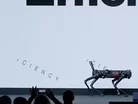MWC: Verizon Harnesses 5G & Edge Computing in Robotics

Kick-starting the first day of Mobile World Conference (MWC) 2021, Verizon showcased two robots on stage in Barcelona. Rima Qureshi, Chief Strategy Officer at Verizon explained that the two robots used 5G connectivity and mobile edge computing to communicate with each other.
Using augmented reality (AR) and machine learning (ML) to analyse bulk data where it is gathered, edge computing requires fast data transfers, something which Verizon reports on high-speed 5G signals can provide.
"When you have more than one robot on the floor, you run into a problem, as these are still just machines, and they can't naturally communicate with one another," said Rima Qureshi, Chief Strategy Officer at Verizon.
"5G will make it possible for robots to connect with other robots and devices of all kinds in a way that simply wasn't possible before," she added.
Making the Factory Floor More Efficient
Expected to reach US$10.6bn by 2028, the global 5G in the cloud market is growing at 79.2% annually, connected, smarter robots that harness 5G are said to be crucial to making factory floors more efficient with the use of automation.
As part of the demonstration, Qureshi beckoned the two robots onto the stage, named Gigi and Mekeal. To train the robots to become aware of their environment beyond a two-dimensional route, Qureshi spoke of engineers jumping in front of the robots, as well as sending other robots into their path and throwing boxes.
"I'm happy to report that neither engineers nor robots were harmed in the process," said Qureshi.
Connected Drone
As well as its work on connected robots, Verizon is also working on connected drones that can be deployed at locations hit by natural disasters. In doing so this avoids putting humans in danger. Controlled by a single operator from hundreds of miles away the drones have live video and thermal imagery available.
Reflecting on the advancements made in drone technology with the use of 4G, Qureshi explained that while drones were able to fly into US fire zones with on-site personnel and send data in almost real-time, drones with 5G could stream panoramic video to multiple recipients, who can focus simultaneously on different aspects of the images.

